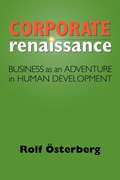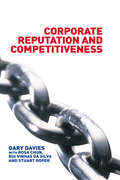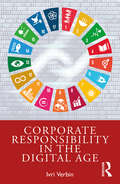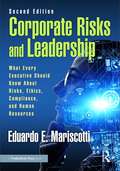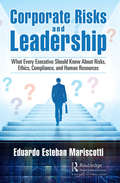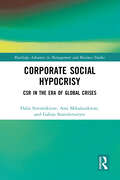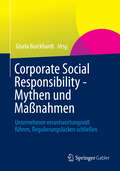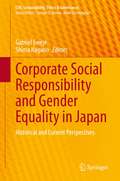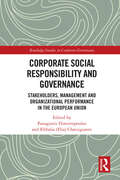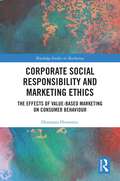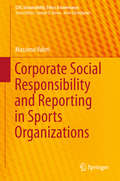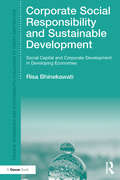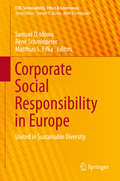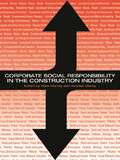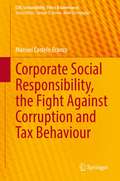- Table View
- List View
Corporate Realities: The Dynamics of Large and Small Organisations (Routledge Revivals)
by Robert Goffee Richard ScaseCorporate Realities, first published in 1995, provides a concise but comprehensive review of the management issues relating to different types of organisation. Avoiding academic jargon, it describes the characteristics of administrative, manufacturing, service and professional organisations. It explores the features of both small and large businesses. The authors demonstrate how the transition from small to large scale can be achieved, as well as reviewing recent attempts to recreate entrepreneurial forms of organisation in the context of larger, more complex ones. Most importantly, it identifies future trends and the skills that will be needed to manage corporations at the turn of the century. This book will be of interest to students of business studies.
Corporate Renaissance: Business as an Adventure in Human Development
by Rolf OsterbergIn this radical book on business and work, Swedish businessman Rolf Osterberg argues that businesses have their priorities all wrong. Paradoxically, corporations also--more than any other institution--have the potential to act as an agent of change toward a human-oriented world. The solution lies in the ongoing fundamental shift in our way of thinking--of our perception of the world, life, the human being, and meaning. This is Osterberg's "new thought." In Corporate Renaissance, Osterberg explores: How the creativity of its employees--not capital--is a company's greatest asset; Why employee-owned companies are the model for the future; Why hierarchies prevent problem-solving; How profit-taking can doom a company; Why setting goals, without an underlying vision, is destructive.
Corporate Reputation and Competitiveness
by Stuart Roper Rosa Chun Rui Da Silva Gary DaviesThis unique book written by four world leaders in reputation research, presents the latest cutting-edge thinking on organizational improvement. It covers media management, crisis management, the use of logos and other aspects of corporate identity, and argues the case for reputation management as a way of overseeing long-term organizational strategy. It presents a new approach to managing reputation, one that relies on surveying customers and employees on their view of the corporate character and in harmonizing the values of both. This approach has been trialled in a number of organizations and here the authors demonstrate how improving reputation, merely by learning more about what a company is already doing, is worth some five per cent sales growth. The book is a vital, up to date resource for specialists in corporate communication, public relations, marketing, HRM, and business strategy as well as for all senior management. Highly illustrated with over eighty diagrams and tables, it includes up to the minute illustrative case studies and interviews with leading authorities in the field.
Corporate Research Laboratories and the History of Innovation (Routledge Studies in Management, Organizations and Society)
by David M. PithanWith the beginning of the twentieth century, American corporations in the chemical and electrical industries began establishing industrial research laboratories. Some went on to become world-famous not only for their scientific and technological breakthroughs but also for the new union of science and industry they represented. Innovative ideas do not simply appear out of the blue and spread on their own merit. Rather, the laboratory's diffusion takes place in a cultural context that goes beyond corporate capital and technological change. Using discourse analysis as a method to comprehensively capture the organizational field of the early American R&D laboratories from 1870 to 1930, this book uncovers the collective meanings associated with the industrial laboratory. Meanings such as what and where a laboratory is supposed to be, who the scientist is, and what it means to practice science provided cultural resources that made the transfer of the laboratory from academic science into an industrial setting possible by rendering such meanings understandable and operable to big business and organizational entrepreneurs fighting for hegemony in a rapidly evolving market. It analyzes not only the corporations that established laboratories in the United States but also their contexts – economic, political, and especially scientific – showing how "the industrial laboratory" was transformed from an organizational novelty into an expected institution in less than two decades. This book will be of interest to researchers, academics, historians, and students in the fields of organizational change, discourse studies, the management of technology and innovation, as well as business and management history.
Corporate Responsibility in the Digital Age: A Practitioner’s Roadmap for Corporate Responsibility in the Digital Age
by Ivri VerbinThis book is a roadmap to help organizations adopt corporate responsibility and sustainability practices and be fit for purpose in a digital era. It explains why corporate responsibility is the only option in the twenty-first-century post-COVID-19 world, and guides readers through the process of transforming their organizations with continued reference to the importance of technology. This is not a technical manual, and it is not an academic textbook: it is designed to be a quick, easily digested read. The first part looks at the current landscape – both of business and of the world in which it operates. The second part explains why corporate responsibility is the only realistic option for business in the twenty-first-century, post-COVID, and who needs to take responsibility for it. The third part is a step-by-step guide to putting principles into practice, covering: values, stakeholder engagement, employees, supply chain, environment, community, customers and marketing, and reporting and transparency. Each chapter is linked to relevant UN Sustainable Development Goals and supported by dozens of real-world examples. By the end of the book, business leaders will have understood the scope of the challenge involved in leading a truly socially and environmentally responsible organization, and, crucially, will have understood why such a course of action is not only desirable but essential. And they will also have been inspired by a sense of purpose. The book offers direct access to the processes, insights, and techniques for installing corporate responsibility throughout organizations large and small, based on the author’s many years’ experience working in government and with successful large corporations. It is up-to-date and relevant, addressing the implications of COVID-19 and the modern technological “Fourth Industrial Revolution.”
Corporate Risks and Leadership: What Every Executive Should Know About Risks, Ethics, Compliance, and Human Resources
by Eduardo E. MariscottiThe context of business has been changing for companies in recent years, and following numerous corporate and accounting scandals, many countries have increased the number of national and international regulations designed to ensure transparency and compliance with the law. Because of the existence of these new regulations, the level of control, the severity of sanctions by governments, and the amount of fines for noncompliance have increased dramatically.In parallel, with the technological revolution in communications, business management has become more transparent, and any negative event is uploaded to social networks and shared with an indeterminate number of people. This change in the regulatory, sanctioning, and technological context has forced large companies to rethink risks, investments, and budgets to deal with this more complex environment.To transition to this change, some companies have included ethics and compliance programs in their corporate agenda, along with marketing and sales plans, strategies, growth targets, investment plans, and/or talent acquisition. While each industry has its particular risks, in this book, the author describes the essential elements that any effective ethics and compliance program should contain.This book is a source of information that connects yesterday with today. The author shares observations and lessons of the past to suggest corporate leaders implement effective ethics and compliance programs to protect their organizations and themselves. This book covers theories of ethics but with an eye focused on practical application. Risks, ethics, and compliance are analyzed with an overall vision, connected to the reality of business life, without getting bogged down in abstract thinking or technical and regulatory details.Ethics and compliance are disciplines that have increasingly achieved greater recognition in organizations. Thus, due to the importance of risk management in the business world and the necessary involvement of the CEO and the board of directors, it seems appropriate that executives get access to this book about risks, ethics, compliance, and human resources directed not only to compliance experts but also to any organizational leader.This second edition offers various examples to cultivate ethical thinking and behavior, identify common risks, and comprehend their adverse effects on organizations.
Corporate Risks and Leadership: What Every Executive Should Know About Risks, Ethics, Compliance, and Human Resources
by Eduardo Esteban MariscottiThe context of business has been changing for companies in recent years, and following numerous corporate and accounting scandals, many countries have increased the number of national and international regulations designed to ensure transparency and compliance with the law. Because of the existence of these new regulations, the level of control, the severity of sanctions by governments, and the amount of the fines for noncompliance have increased dramatically. In parallel, with the technological revolution in communications, business management has become more transparent, and any negative event is uploaded to social networks and shared with an indeterminate number of people. This change in the regulatory, sanctioning and technological context has forced large companies to rethink risks, investments and budgets to deal in this more complex environment. To transition to this change, some companies have included ethics and compliance programs in their corporate agenda, along with marketing and sales plans, strategies, growth targets, investment plans and/or talent acquisition. While each industry has its particular risks, in this book, the author describes the essential elements that any effective ethics and compliance program should contain. This book is a source of information that connects yesterday with today. The author shares observations and lessons of the past to suggest corporate leaders implement effective ethics and compliance programs to protect their organizations and themselves. The book covers theories of ethics but with an eye focused on practical application. Risks, ethics, and compliance are analyzed with an overall vision, connected to the reality of business life, without getting bogged down in abstract thinking or in technical and regulatory details. Ethics and compliance are disciplines that have increasingly achieved greater recognition in organizations. Thus, due to the importance of risk management in the business world and the necessary involvement of the CEO and the board of directors, it seems appropriate that executives get access to a book about risks, ethics, compliance and human resources directed not only to compliance experts but also to any organizational leader. This book is a wake-up call that allows business leaders to understand the benefits of implementing an effective ethics and compliance program that will help members of organizations to make the right decisions and act within the law. If they do, they can better prevent and react to the difficult obstacle course of risks, dangers and threats that organizations face and that may jeopardize the sustainability, resilience, and survival of companies.
Corporate Sector Restructuring
by Mark R. StoneExamines the steps involved in restructuring the corporate sector. Large-scale corporate restructuring made necessary by a financial crisis is one of the most daunting challenges faced by economic policymakers. The government is forced to take a leading role, even if indirectly, because of the need to prioritize policy goals, address market failures, reform the legal and tax systems, and deal with the resistance of powerful interest groups.
Corporate Social Entrepreneurship
by Christine A. HemingwayBusiness ethics teaching appears to have had little impact, particularly in the light of continued malpractice and misdemeanour in the form of financial scandals, environmental disasters and adverse consequences for communities. This timely book directly addresses a central question: is it that the existence of an ethical or an unethical climate influences behaviour, or, does the presence or absence of a moral character and personal values have the greatest influence on behaviour at work? Drawing on an empirically derived study and over thirty years of experience in both the public and private sectors, Hemingway proposes four modes of individual moral commitment to corporate social responsibility (CSR) and sustainability: the Active Corporate Social Entrepreneur, the Concealed Corporate Social Entrepreneur, the Conformist and the Disassociated. The discovery of the corporate social entrepreneur offers students and scholars a critical, alternative and optimistic perspective for the future of ethical business.
Corporate Social Hypocrisy: CSR in the Era of Global Crises (Routledge Advances in Management and Business Studies)
by Asta Mikalauskienė Dalia Steimikiene Gabija StanislovaitytėMany new challenges including competitiveness are emerging for sustainable business during this era of disruption. This book analyses these challenges to sustainable development and growth and addresses the impact of corporate social responsibility on the competitiveness of organisations. The authors analyze the major challenges for competitiveness of sustainable business in the COVID-19 era, taking into account a new business environment amid major global risks and uncertainties linked to climate change, pandemics, Russian-Ukrainian war, and intuitions of forthcoming new world economic crisis. The monograph consists of five parts: 1) sustainable development goals and the role of business; 2) climate change, COVID-19, fragile political situation, and business; 3) corporate social responsibility and corporate social hypocrisy; 4) corporate social responsibility, corporate social hypocrisy, and competitiveness of business; and 5) case study on the impact of corporate social responsibility on competitiveness with the impediments of corporate social hypocrisy. The book presents new insights in assessing the impact of CSR on competitiveness of companies with the impediments of corporate social hypocrisy. The developed framework and case study allows to develop valuable policy and managerial implications for sustainable business and engagements in corporate social responsibility as well as to show the danger of corporate social hypocrisy for competitiveness. This book will be of value to researchers, academics, and students in the fields of corporate social responsibility, organizational management, business ethics, and responsible business.
Corporate Social Involvement: Social, Political and Environmental Issues in Britain and Italy (Routledge Revivals)
by Michael MarinettoFirst published in 1998. This is an examination of corporate social responsibility in Britain and Italy. There is a growing interest in businesses rendering themselves more socially active and becoming more involved in addressing social problems. A number of British companies have been adopting many of the community practices that have characterized corporate life in America since the early 1960s. Corporate responsibility is defined as a business engagement in the wider community in order to contribute towards the general well-being of society. This study employs a hybrid methodology using a variety of sources including historical texts, secondary studies and detailed case studies of corporate social programmes. Businesses studied include Shell, BT, Unilever, and BAT Industries in Britain, and Fiat, Olivetti, ENI, IRI and Dioguardi in Italy. The study aims to provide a qualitative explanation of why companies go beyond their commercial remit to become engaged in communitarian and philanthropic action. Ultimately, the book aims to present a socially and politically informed analysis placed in its historical and political context, taking into consideration economic forces.
Corporate Social License: A Study in Legitimacy, Conformance, and Corruption
by Petter Gottschalk Christopher HamertonThis book makes a distinctive and innovative contribution to the study of white-collar and corporate crime through detailed examination of the use, affect, and violation of the corporate social license – a concept frequently extended to a license to operate. Whilst discrete aspects of corporate social responsibility have found their way into the discourse on business deviance and crime, no single book to date has provided a detailed exploration of social licence through a criminological lens. Here, using an interdisciplinary focus which includes illustrative case-studies and large-scale original fieldwork, Gottschalk and Hamerton explore European, North American, Asian, and global perspectives to identify, position, and reveal the impact of the social license on contemporary conceptions of white-collar and corporate deviance and crime. Corporate Social License: A Study in Legitimacy, Conformance, and Corruption will be of interest to scholars of criminology, law, business management, and sociology along with professionals within allied fields.
Corporate Social Responsibility - Mythen und Maßnahmen: Unternehmen verantwortungsvoll führen, Regulierungslücken schließen
by Gisela BurckhardtIn Zeiten der Globalisierung und Massenproduktion rückt verantwortungsvolle Unternehmensführung immer mehr in das Bewusstsein der Unternehmen. Damit Corporate Social Responsibility in Organisationen nicht als reine PR-Maßnahme angesehen wird, braucht es jedoch zunächst ein tiefes Verständnis, was sich hinter dem Begriff eigentlich verbirgt. Dieses Buch zeigt die Bandbreite von Unternehmensverantwortung zwischen Freiwilligkeit und Regulierung in globalen Lieferketten auf. Es stellt Maßnahmen und Initiativen von Unternehmen vor und gibt konkrete Empfehlungen, wie sinnvolle und nachhaltige CSR-Maßnahmen in Organisationen umgesetzt werden können.
Corporate Social Responsibility and Gender Equality in Japan: Historical and Current Perspectives (CSR, Sustainability, Ethics & Governance)
by Gabriel Eweje Shima NaganoThis book examines key issues in gender equality and corporate social responsibility in Japan. Legal compliance, the business case and social regulation are examined as driving factors for enhancing gender equality in corporations. In turn, case studies from various contexts, such as the hotel industry, retail and financial services companies add practical insights to the theoretical debate. The role of governments, NGOs and supranational organizations is examined as well. Given its scope, the book will appeal to undergraduate and graduate students, scholars, policymakers and practitioners interested in advancing the gender, CSR and sustainability debates.
Corporate Social Responsibility and Governance: Stakeholders, Management and Organizational Performance in the European Union (Routledge Studies in Corporate Governance)
by Panagiotis Dimitropoulos Efthalia Elia ChatzigianniCorporate social responsibility (CSR) has developed into a crucial corporate and organizational issue around the world. It has been incorporated into various sectors and countries, and includes many types of activities and dimensions. It is a common notion that organizations are more inclined today to broaden and shift their performance focus from short-term goals towards long-term social, environmental, and value-added perspectives. Under the framework of corporate governance, organizations and companies are motivated to promote fairness, transparency, ethics, and accountability in their transactions, while concurrently maintaining enhanced standards of governance. This means that organizations and corporations must align their activities with community aspirations which is an issue falling within the sphere of CSR. Increased attention has been placed on the organizations regarding their approach towards the needs of various stakeholders. However, a crucial issue that this book attempts to address is the association, intersection, and inter-relationship between governance and CSR within the EU region, which are not adequately established in the existing literature. The book will show that governance and CSR are highly connected. With the purpose of studying the association of CSR with legal, managerial and empirical aspects of governance in corporations and not-for-profit organizations, in various sectors of the economy, the book also intends to provide useful policy implications, as well as to offer constructive directions for future research. This book will be of value to researchers, academics, practitioners, policymakers, and students in the fields of CRS and governance, organizational theory, marketing management, business ethics and human resource management.
Corporate Social Responsibility and Governance: Stakeholders, Management and Organizational Performance in the European Union (Routledge Studies in Corporate Governance)
by Panagiotis Dimitropoulos Efthalia Elia ChatzigianniCorporate social responsibility (CSR) has developed into a crucial corporate and organizational issue around the world. It has been incorporated into various sectors and countries, and includes many types of activities and dimensions. It is a common notion that organizations are more inclined today to broaden and shift their performance focus from short-term goals towards long-term social, environmental, and value-added perspectives.Under the framework of corporate governance, organizations and companies are motivated to promote fairness, transparency, ethics, and accountability in their transactions, while concurrently maintaining enhanced standards of governance. This means that organizations and corporations must align their activities with community aspirations which is an issue falling within the sphere of CSR. Increased attention has been placed on the organizations regarding their approach towards the needs of various stakeholders. However, a crucial issue that this book attempts to address is the association, intersection, and inter-relationship between governance and CSR within the EU region, which are not adequately established in the existing literature. The book will show that governance and CSR are highly connected. With the purpose of studying the association of CSR with legal, managerial and empirical aspects of governance in corporations and not-for-profit organizations, in various sectors of the economy, the book also intends to provide useful policy implications, as well as to offer constructive directions for future research. This book will be of value to researchers, academics, practitioners, policymakers, and students in the fields of CRS and governance, organizational theory, marketing management, business ethics and human resource management.
Corporate Social Responsibility and Marketing Ethics: The Effects of Value-Based Marketing on Consumer Behaviour (Routledge Studies in Marketing)
by Honorata HowaniecChanges in the economy and greater competition force us to adapt our business practices and to take greater account of the needs of consumers and the social problems they care about. Consumers are placing an increasing weight on the social responsibility of the organisations they choose to purchase from and associate with, and businesses must adopt corporate social responsibility (CSR) practices into their marketing strategies. This book demonstrates the concept of CSR and how it is included as an element of value-based marketing. Using research from the Polish market, the author explores the concept of value-based marketing, how organisations are implementing CSR, and analyses the effect on consumer behaviour. It examines consumer awareness of CSR practices and the effect this has on their purchasing decisions and brand loyalty, making the argument that disregarding CSR can be detrimental to businesses success and profit. Providing both empirical and theoretical perspectives, this book will be a useful reference for scholars and upper-level students across business disciplines including marketing, CSR, and business ethics.
Corporate Social Responsibility and Reporting in Sports Organizations (CSR, Sustainability, Ethics & Governance)
by Massimo ValeriThis book explores the key issues of corporate social responsibility (CSR) and reporting as applied to sports organizations, with particular attention to the Italian environment. It is divided into two parts, the first of which examines the general principles and reporting tools of CSR; these represent the reference point for all types of organization, including sports organizations. The coverage encompasses the evolution of CSR and the latest standards issued by authoritative international public and private institutions. The aim is to provide readers with a sound basis for understanding fully the application of these principles and reporting tools within the world of sport. The second part is devoted to a detailed analysis of the CSR strategies and social reporting initiatives adopted by sports organizations. Although the focus is primarily on Italian sports organizations, due attention is also paid to world benchmarks. In particular, the analysis examines the CSR strategies and reporting initiatives developed by international and Italian sports federations and by two international professional football clubs. The book will be of wide interest to academics, students, and practitioners.
Corporate Social Responsibility and Sustainable Development: Social Capital and Corporate Development in Developing Economies (Finance, Governance and Sustainability)
by Risa BhinekawatiMany different companies can significantly contribute to the integrated goals and targets of the United Nations’ sustainable development goals, such as poverty reduction by 2030. Poverty is not only about people living on less than $1.25 per day, but more fundamentally, it is their lack of capabilities and access to participate in productive economic activities. If companies can contribute in order to provide access and the necessary skills, then individuals will have the capabilities to achieve their aspirations, including earning a higher income. Corporate Social Responsibility and Sustainable Development supports Sen’s assertions that poverty can be alleviated if the capability of individuals is improved. Beyond that, this book shows that sustainable development goals can be achieved when the company’s CSR programs and social capital development in improving people’s capabilities are combined with necessary finance access and market access for the poor. The theoretical model developed from the journey of Astra International, one of the largest public-listed companies in Indonesia, is replicable for other companies aspiring to be sustainable in developing countries. The model shows a virtuous cycle between the corporate aim, CSR programs, social capital and corporate sustainability. This volume is of great value to academics, practitioners and policy makers interested in the themes of CSR, social capital and sustainable development of developing countries. It also appeals to professionals in industry associations, development agencies and international organizations, as well as NGOs that are concerned with the achievement of sustainable development goals by 2030.
Corporate Social Responsibility and the Supply Chain: CSR Collaboration with Suppliers (Routledge Open Business and Economics)
by Monika JedynakDue to the growing importance of global interdependencies, corporate social responsibility has become an important issue both for the business and the entire society. Customers expect corporate social responsibility, and if an organization is insensitive to these issues, it runs the risk of losing its key customers. The interaction and integration of corporate social responsibility and supply chain management have led to the emergence of sustainable supply chain management. This book is a comprehensive study that deals with the subject of collaboration with suppliers, considering the CSR guidelines. It presents new research about suppliers, their importance in supply chains, and in the context of social responsibility and acts as a new source of content that fills the gap in this area. It may be of interest to researchers interested in CSR as well as supply chains, business relations, and, broadly understood, collaboration. It provides knowledge to many recipients including scientists and researchers, advanced students, and graduates.The Open Access version of this book, available at www.taylorfrancis.com, has been made available under a Creative Commons Attribution-Non Commercial-No Derivatives (CC-BY-NC-ND) 4.0 license.Any third party material in this book is not included in the OA Creative Commons license, unless indicated otherwise in a credit line to the material. Please direct any permissions enquiries to the original rightsholder.The publication has been supported by a grant from the Faculty of Management and Social Communication under the Strategic Programme Excellence Initiative at Jagiellonian University.
Corporate Social Responsibility in Europe: United in Sustainable Diversity (CSR, Sustainability, Ethics & Governance)
by Samuel O. Idowu René Schmidpeter Matthias S. FifkaThis book explores the current state of Corporate Social Responsibility (CSR) in 24 European nations, examining the state of the development and practice of CSR and sustainability for organizations in these countries. The common denominator for all of the book's 25 chapters is a management perspective rather than an ethical discourse. The book therefore represents a comprehensive survey of initiatives and activities in the field of CSR and provides a wealth of complete cases and examples for different approaches to sustainable and responsible management practice. The book also reviews the relevant political and governmental guidelines and frameworks for organizations, both on a national and a European level. Europe has taken a leading role in the promotion and implementation of CSR. This book showcases how, through CSR, enterprises can significantly contribute to achieving the European Union's treaty objectives of sustainable development and a highly competitive social market economy.
Corporate Social Responsibility in the Construction Industry
by Mike Murray Andrew DaintyThe construction process, right through from planning and design to use and demolition, has a major impact on society. Traditionally, concern has been focused on its environmental impact and the quest for sustainability, but this has now extended into the wider remit of Corporate Social Responsibility (CSR). Essentially, this means that businesses must act (voluntarily) in a socially ethical manner by developing a policy that encompasses the core principles enshrined by CSR. A unique presentation on a topic of emerging importance, Corporate Social Responsibility in the Construction Industry is essential reading for all built environment undergraduate and post-graduate courses, as well as CEOs and senior managers within construction businesses who may be about to embark on developing a CSR strategy.
Corporate Social Responsibility, the Fight Against Corruption and Tax Behaviour (CSR, Sustainability, Ethics & Governance)
by Manuel Castelo BrancoThis book introduces in an accessible way how CSR and its reporting are being used to address problems of corruption and tax evasion or tax avoidance. It discusses the efforts, both of organizations and governments to integrate these issues into CSR practices and the developments that have occurred at the levels of national and international legislation. The book analyses governments efforts to compel or try to induce companies to have practices more in line with what is expected of them in terms of combating corruption and paying their fair share. The book is suitable for students of CSR and Business Ethics, practitioners and researchers on CSR and corporate issues.
Corporate Social Strategy
by Bryan W. Husted David Bruce AllenCan good-will be good business? Firms are increasingly called upon to address matters such as poverty and human rights violations. The demand for corporate social responsibility (CSR) is directed mainly at top management in multinational corporations who are reminded that, in addition to helping to make the world a better place, their commitment to social action will be rewarded by lasting customer loyalty and profits. But is it true that firms that engage in social action will be rewarded with a good name, competitive advantage, superior profits and corporate sustainability? What if it is true for some firms and not for others? This book addresses these and other questions by explaining the how and why of creating value and competitive advantage through corporate social action. It shows how and when firms can develop successful corporate social strategies that establish strong commitments to shareholders, employees and other stakeholders.
Corporate Strategy: A Feminist Perspective (Routledge Research in Strategic Management)
by Angelique Du-ToitThis book takes a fresh look at corporate strategy, exploring it from a feminist perspective. Challenging male-dominated theory, Corporate Strategy looks at unquestioned assumptions held about strategy in practice and academia, including whether women approach strategy differently from men, and if so, how their approach differs? Reviewing the histories of strategy and feminism, the book explores the reasons why so few serious works on strategy have been written by women, and investigates the continued lack of women at senior levels within many organizations. Angélique du Toit draws on postmodern arguments to illustrate the claims made for the necessity of diversity within organizations, and challenges the fact that positions of power, both in society and organizations remain the exclusive right of men. Corporate Strategy argues that if an organization is to survive and succeed in the global economy, it has to pay more than lip service to issues surrounding diversity.

